It has been said that most tournament players play the openings like Grandmasters, the middle game like experts, and the endings like children. This holds true, to a large extent, at any level below Master. Memory, study, a familiarity with opening principles means that most games are decided in the middle game or later with only a small percentage of games actually being decided in the opening.The opening is not the strongest part of my game. Although I am sufficiently familiar with general principles to play a wide range of opening systems with some comfort, when I sit across the board from a player that has invested considerable time in opening preparation, I have a sense of inadequacy. The level at which I am beginning to play, and that I hope to begin playing--regularly scoring wins against class A players, and beginning to score against experts--requires specific opening preparation.
Alex Dunne, How to Become a Candidate Master (1986), 1
Last summer, while preparing for the City Championship match, I developed some specific lines against the Dutch Defense. The level of my preparation was such that I scored my first ever draw against Hiarcs 12 playing at full strength (but forced to meet 1.d4 with 1...f5). In a game/15 I drew the beast; that was one of nearly a dozen such training games. This opening work was largely responsible for my performance in the City Championship itself, assisting my success in earning a single draw against a FIDE Master, and very nearly two draws.
That was specific preparation for play against one opponent, but I need to have a battery of prepared lines available for other opponents. I'm not thinking necessarily of lines tailored to the playing styles of particular adversaries, although useful, but specific lines for openings that I'm likely to find myself playing. I need some lines, for example, against the King's Indian Defense. It will come up since 1.d4 is my principal standard, and it would be nice to occasionally uncork a well-prepared novelty or the latest theory against a worthy opponent.
In my game against John Julian Saturday night, I wanted to play the English, partly because I'd beat him in a casual game a few months ago that we played on Facebook.
James Stripes - John Julian [A25]
Facebook, Chess.com Application, 2009
1.c4 e5 2.g3 g6 3.Bg2 Bg7 4.Nc3 Nc6 5.Rb1 d6 6.b4 f5 7.d3 Nf6 8.e3 0–0 9.Nge2 Ne7 10.0–0 c6 11.b5 Be6 12.bxc6 bxc6 13.Qa4 Qd7 14.Ba3 Rf7 15.Qa6 Ne8 16.Qb7 Nc7 17.Qb4 Rd8 18.Qa5 Nc8 19.Rb7 f4 20.exf4 exf4 21.Ne4 f3 22.Bxf3 Rxf3 23.Rxc7 Qe8 24.Nf4 d5 25.Nxe6 Qxe6 26.Ng5 1–0
Although John claimed he was not taking that game as seriously as I did, it appeared from his first move on Saturday that he intended to avoid a repeat of this reversed Sicilian. We quickly transposed into a line of the King's Indian that I had glanced at superficially in mid-April when I read a single chapter--the last--in Joe Gallagher, Starting Out: The King's Indian (2002).
Stripes,J (1819) - Julian,J (1998) [E70]
City Championship Contenders, Spokane Valley, 2009
1.c4 g6 2.Nc3 Bg7 3.d4 Nf6 4.e4 d6 5.Bd3

Some strong grandmasters play this system quite regularly and its main supporter over the years has been the former American Champion Yasser Seiriwan.If Yasser plays the system, it is good enough for me!
Gallagher, 164
5... 0–0 6.Nge2 e5 7.Bg5?
My recollection of the line has failed. 7.d5 is the correct move.
7... h6 8.Bd2?!
This move appears to be the novelty. 8.Bh4 is more in the spirit of the previous move and seems to have been played in a few games, but not by any strong players because they do not play 7.Bg5.
8... Nc6 9.d5 Ne7 10.0–0
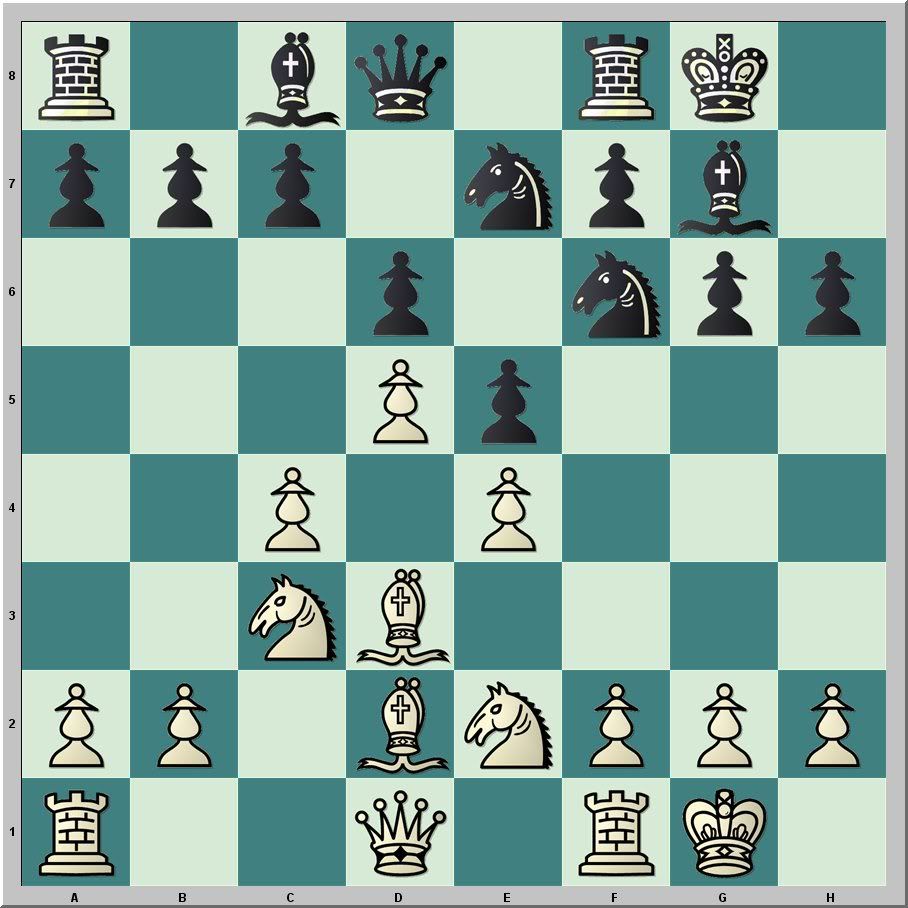
Despite the lack of adequate preparation, I've reached a reasonable position. Black has some difficulties to solve, and I have my plan for meeting the KID's dangerous f7-f5 thrust. On the other hand, I've used nearly half an hour to my opponent's four minutes.
10... Nh7
prepares f7-f5, and it's time to decide where my queen should go
11.Qc2 f5 12.f4
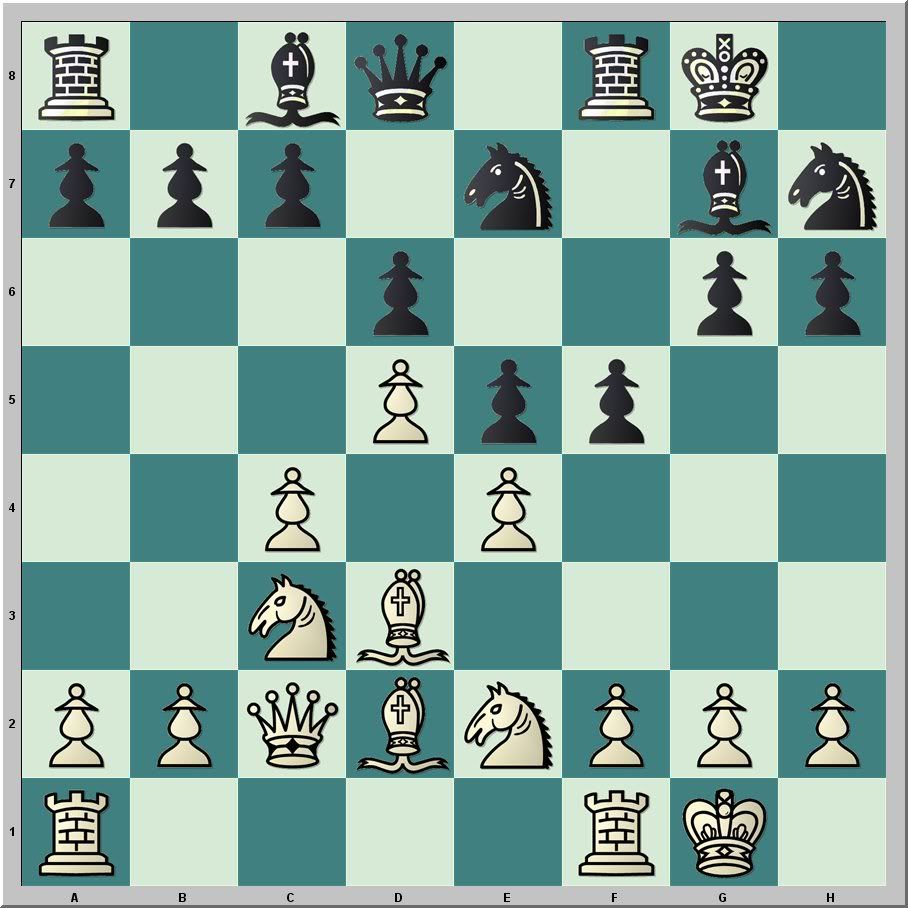
I failed to remember accurately Gallagher's statement that White plans "to meet any subsequent ...f7-f5 by Black with exf5 and f2-f4" (164). I did not forget these two moves, but the sequence in which Gallagher listed them. Does it make a difference? Should White first play exf5, then advance the f-pawn? As it turns out, Hiarcs 12 assesses my 12.f4 as correct. I have a slight advantage, equivalent to nearly a pawn according to my engine.
12... fxe4 13.Bxe4 Bf5 14.Rae1
14.fxe5 was probably better
14...c6 15.fxe5 dxe5 16.Ng3 Qd7 17.Be3 Bxe4
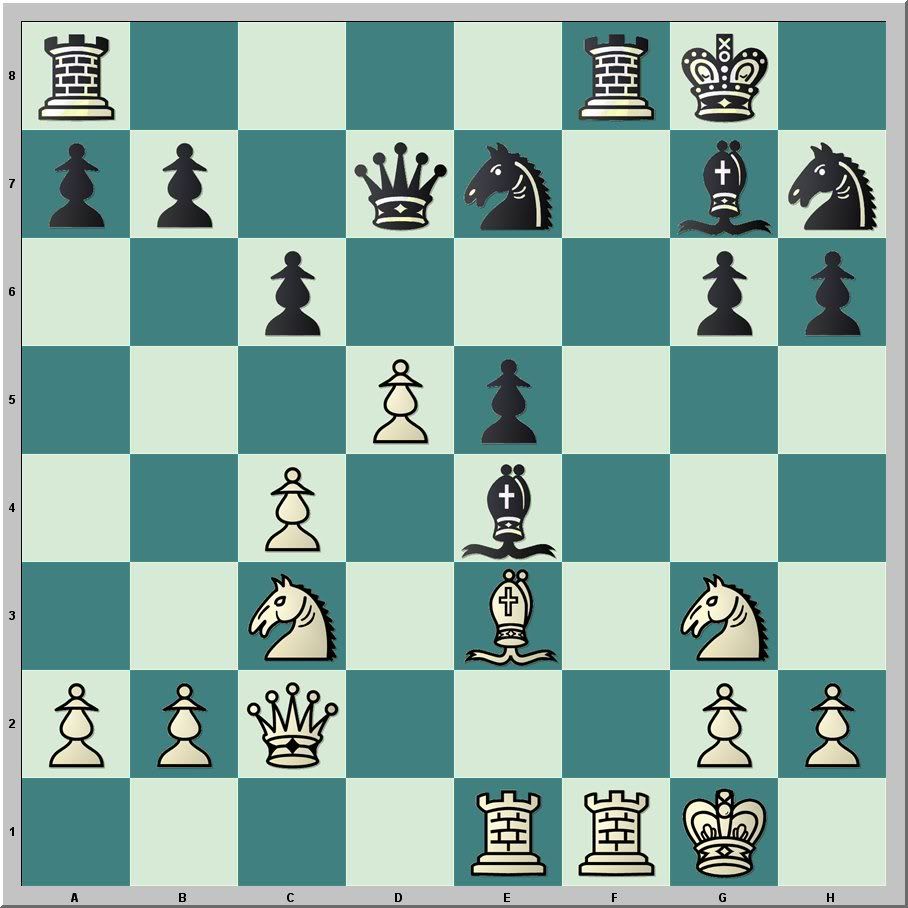
18.Ncxe4?
I removed the bishop from the board, hovered my hand over one knight, then over the other. After a pause, I picked up the wrong knight and moved it where the bishop had been. Just before this move, I had received a text from my wife telling me she had found the spare rings for our Magic Bullet! I responded to my wife before returning my attention to the board.
The horror! The horror!I realize that cell phones are not permitted in most tournaments, and that sending and receiving texts arouses suspicions of cheating. But small local affairs where everyone knows each other fairly well differs from large events full of strangers. Many of my opponents have been in my home. John has been here several times to play make-up games for club events, and for us to work together on match preparation. He was essentially my trainer for last year's City Championship, and we spent the better part of one day pouring through Informants, the Encyclopedia of Chess Openings, and running engine analysis of key lines we thought worthy of consideration.
Joseph Conrad, Heart of Darkness
In these local affairs, we tolerate marginal breaches of these emergent rules against cell phone use, although I am getting close to forfeiting one player whose ringer never seems to be turned off, and his phone inevitably rings during play. I always set my phone to vibrate, except when I set it to silent, as I did for the Washington Open.
After the game, John told me to pass on his thanks to my wife for the distraction that provoked my selection of the wrong knight.
18.Ngxe4
18.Qxe4 is also better
18...cxd5 19.cxd5 Qxd5
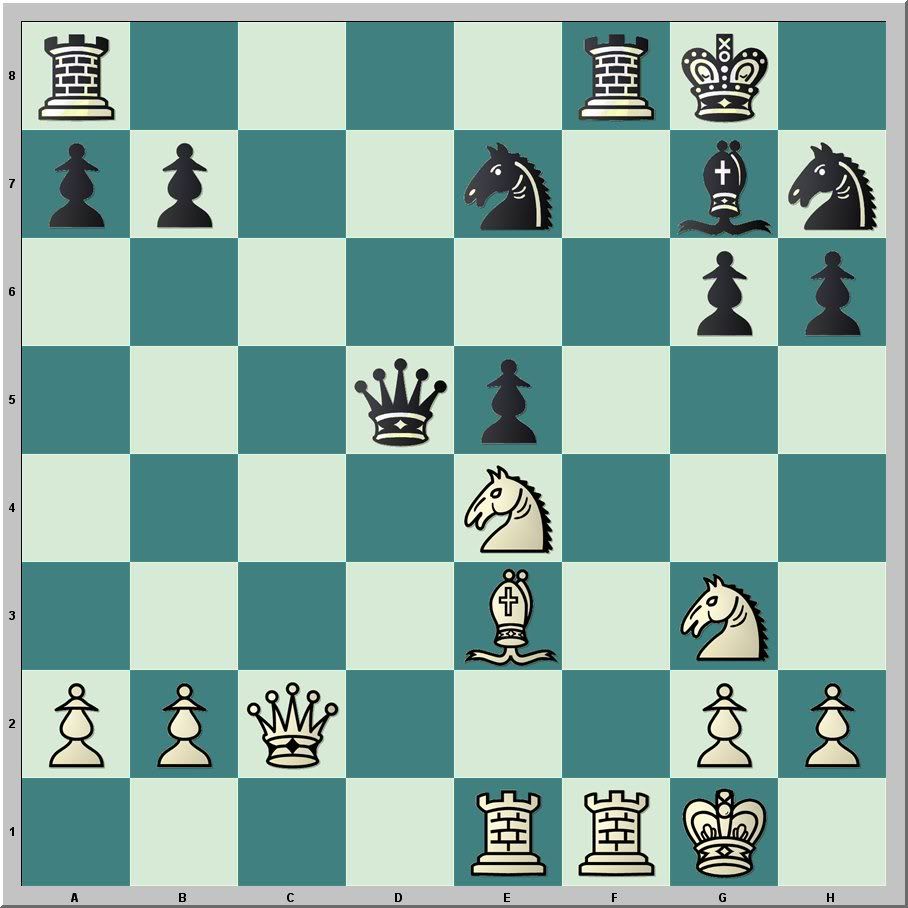
I'm down a pawn, yet Hiarcs 12 still sees me as having an advantage of 1/2 pawn. I thought that I had some play for the material, but at this point I'm looking to struggle for a draw.
20.Nc3
Hiarcs likes 20.Rxf8 Rxf8 21.Qc5, which I recall examining briefly during the six minutes I thought about this move.
20...Qc6 21.Qb3+ Kh8 22.Nge4 b6 23.Rf7 Rxf7 24.Qxf7 Nf5 25.Bf2 Qe8
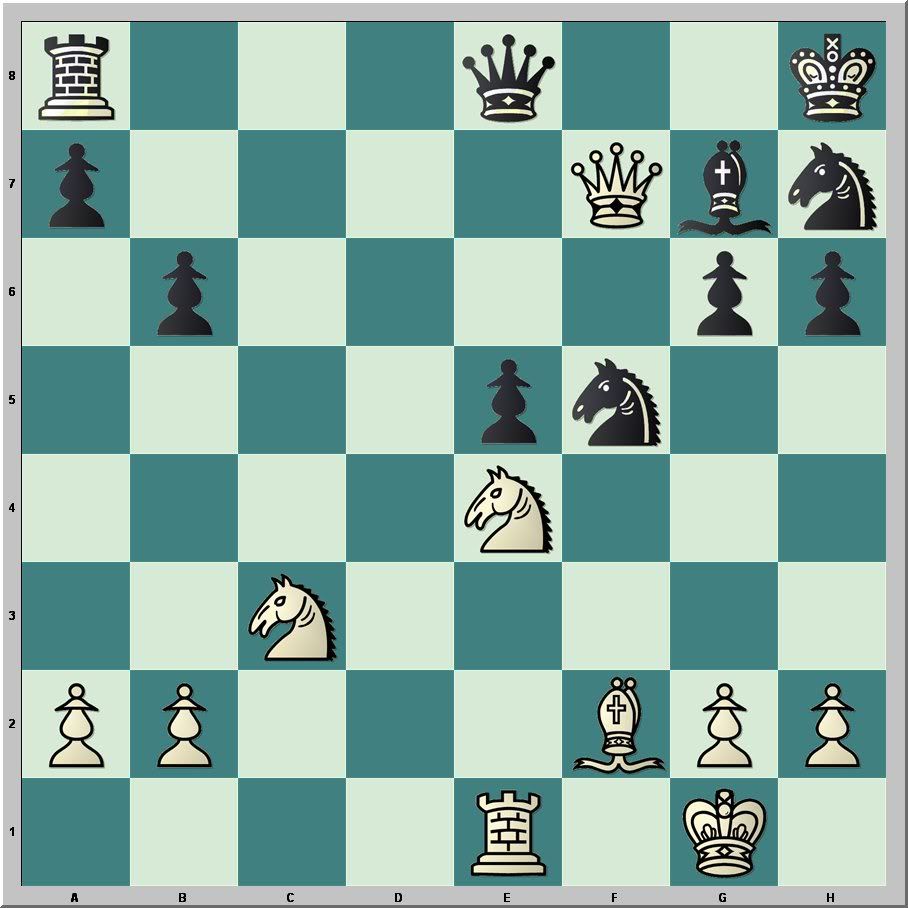
Should I trade queens? I choose to do so, and bit by bit, my position worsens.
26.Qxe8+ Rxe8 27.g4 Nd4 28.Nd6?
This aggressive move makes things worse. 28.Kg2 is better.
28... Nf3+ 29.Kh1 Rf8 30.Re2 Kg8 31.Nd5 Nf6 32.Ne7+ Kh7 33.h3 Rd8
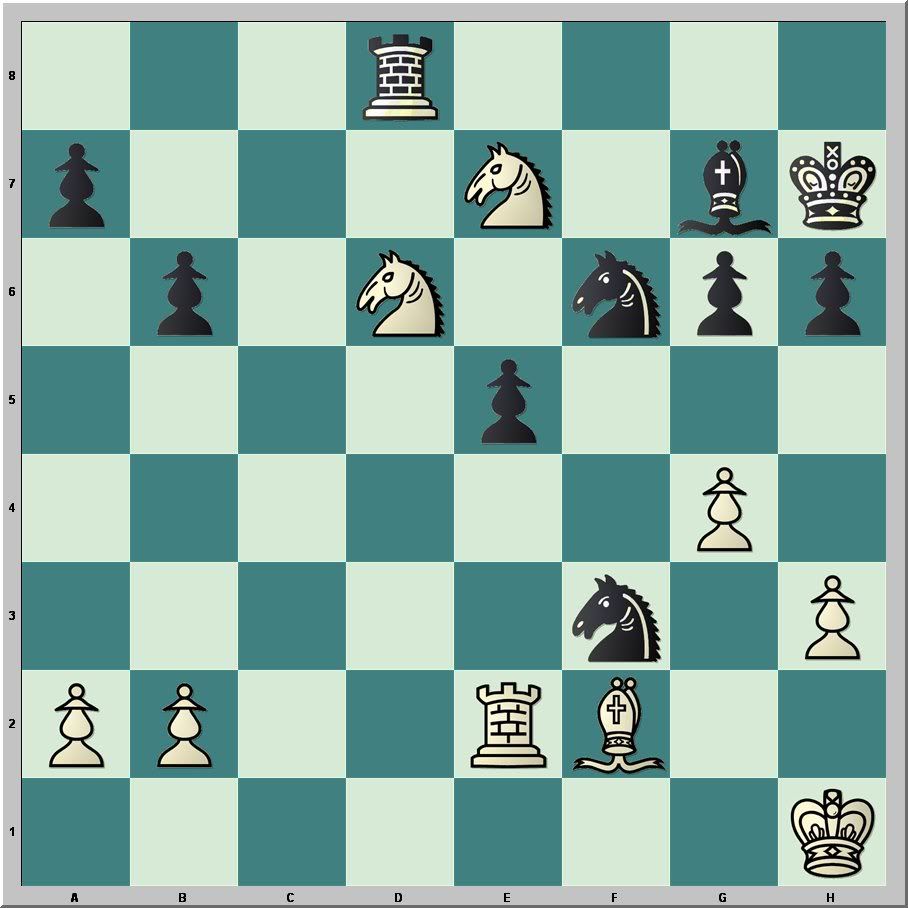
34.Ne4?
34.Nc4 keeps the knight on the board and makes my opponent show more technique to secure the win.
34...Nxe4 35.Rxe4 Rd2-+
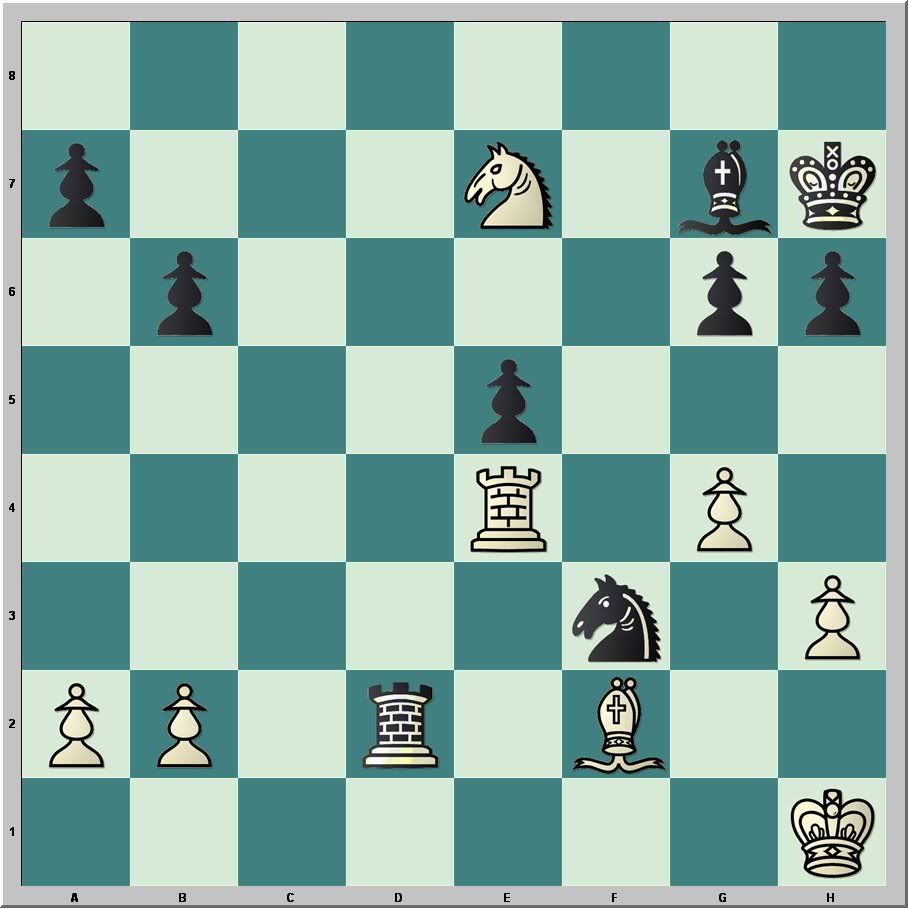
I could resign, but given that John will win the event and thus need to start serious preparation for the City Championship, making him work for every little bit is an effort to assist his preparation. I know he will win, but as his friend, I fight on as the stubborn old man that I am. Let him cuss.
36.Kg2 Ng5 37.Ra4 Nxh3 38.Kxh3 Rxf2 39.Nd5 Rf7 40.Kg3 Bf8 41.Nc3 Bc5 42.Ne4 Bd4 43.b3 a5 44.Rc4 Kg7 45.Rc6 Re7 46.Kf3 Rf7+ 47.Kg3 Rf1 48.Rc7+ Rf7 49.Rc6
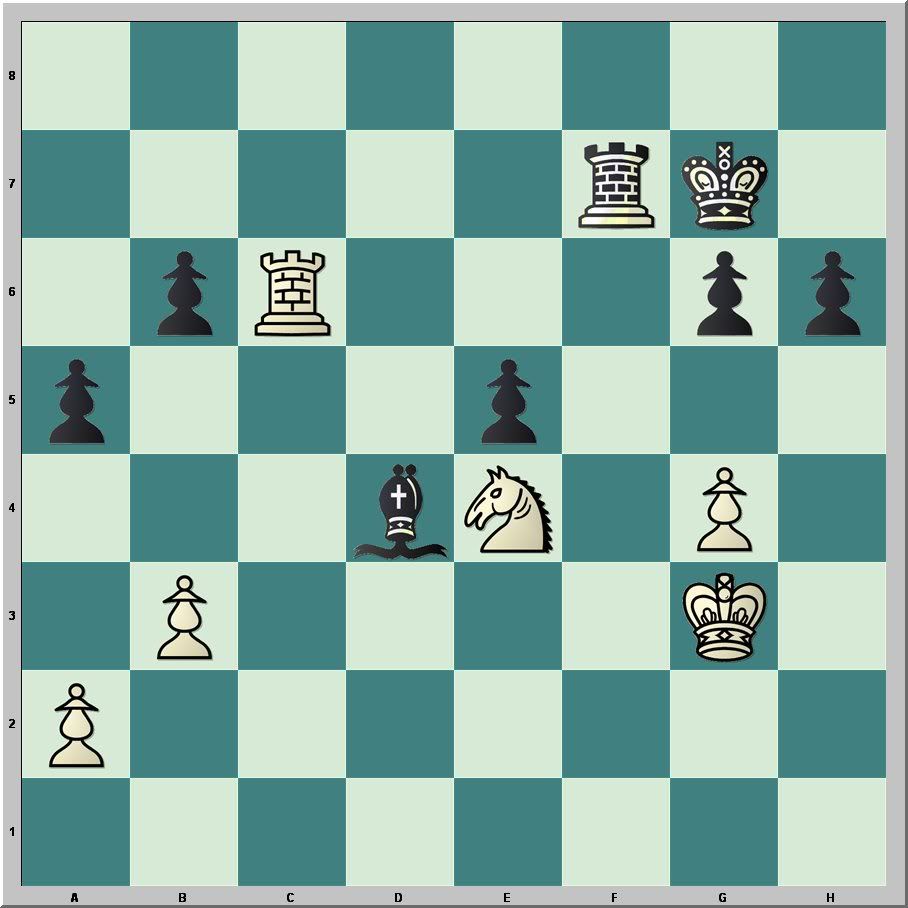
49... Rf4
This move has been waiting for him to find it, and he does after several other tries.
50.Rc7+ Kf8 51.Nd2 Bf2+ 52.Kg2 Be1 53.Nf3 Rxg4+ 54.Kf1 Rf4 55.Ke2 Bb4 56.Rb7 Bc5 57.Ne1 e4 58.a4 Rf7 59.Rb8+ Kg7 60.Nc2 Re7 61.Ne3 Bxe3 0–1
Earlier in the day, I had White against Adam Attwood. He plays the Pirc, and I'm not presently happy with my repertoire against that system. On my walk that morning, I decided I would play 1.f4 to make things interesting. Adam replied 1...g5 to my surprise. As the game developed, I sacrificed a knight to bring his king into the center. Adam defends well, and survived the onslaught. To my relief, he offered a draw in a position that he could have won. On Sunday morning, Adam drew John, finishing the event without a loss and capturing second. Ryan failed to show up and everyone got one freebie as a consequence. I won my games against Ron Weyland and Sattar Sattarov and finished third.
In this event, I advanced towards one intermediate goal: staying in class A. Indeed, I went up from 1819 to 1824. John went back over 2000, but Adam was the big winner rating-wise, finding a new peak rating at 1759. His second place earns him free entry into the Spokane Falls Open. I need to prepare my line against the Pirc in case we play then.













In this game I really would have repeated the line from the Facebook game (which I might add was played by black in a very off-the-cuff manner). I was just playing move-order games with you. :)
ReplyDeleteJohn
P.S. Great blog!
If you win rating then it cannot have been a bad tournament. So congrats!
ReplyDeleteThe hicups that appeared in this little tournament are the things you need to work on but i guess you know that already. :-)